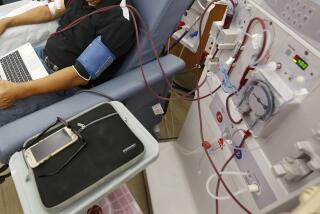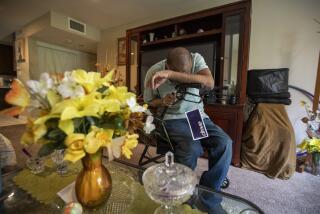New Heart for One Man, Waiting Game for Another : No Ready Answers for Patient
- Share via
Jeff Bergan has always worked hard for what he wanted.
As an athlete at Mission Viejo High School, he trained like a fiend. As a wrestling and football coach at the same school, he worked his athletes like a fiend.
Then, Bergan’s health deteriorated. His kidneys failed two years ago, and he had to be placed on a dialysis machine. In December, doctors discovered that Bergan’s heart was failing as well.
Without a heart transplant, his doctor in Orange County warned, the 26-year-old Bergan would be dead in less than two years. Without a new kidney, the doctor also said, Bergan might not survive the new heart.
So, Bergan went shopping for a new heart and kidney. And that process has been hard work as well.
Bergan had to overcome a financial shortage and hospital delays just to get in to see doctors who could help him at Stanford University Medical Center, which is the only facility west of the Mississippi authorized to conduct a combined heart-kidney transplant operation. Now that he has seen the doctors this week, they say they have no ready answers.
A team of about 30 cardio-transplant physicians met Friday at Stanford to review Bergan’s case, but they reached no consensus. More study is needed, they said, before a decision can be reached on whether Bergan should receive a simultaneous heart-kidney transplant, a kidney transplant followed by a heart transplant later, or just wait a few more months to see what happens.
Dr. Michael Fowler, Bergan’s lead physician, said Friday that a decision on Bergan probably would be made next week.
Bergan, meanwhile, was left Friday to lie in a hospital bed and ponder his fate, with his mother, Sandra, sitting by his side. He accepted his predicament glumly but without complaint.
“If this isn’t the time for a transplant, I’m not upset that I didn’t get it,” Bergan said in a telephone interview from his hospital room. “But I’m still going to have to go on living with dialysis. I just have to wait.”
Living on dialysis means being hooked up to a blood-cleaning machine three times a week, four hours a day for the rest of his life. Dialysis is a process by which blood is circulated through a machine and cleansed of impurities. Bergan’s kidneys function at only about 5% by themselves.
Although his doctor and friends all praised Bergan for his strength in facing this health crisis, his mother acknowledged that her son--a 6-foot, 200-pound former star in football, wrestling and rugby--has had difficulty dealing with his sudden handicap.
“He has felt anger, and it has been rough,” said Sandra Bergan, 47. “Now he’s very quiet, very close-mouthed about it.”
Bergan’s current health troubles began in the spring of 1986 when severe leg cramps awakened him in the middle of the night and he noticed he was tired all the time. He was attending classes at Cal State Fullerton at the time, so he consulted a university physician and the kidney problem was diagnosed.
Kidneys Damaged
Doctors believe that the kidneys were damaged when Bergan developed high blood pressure. Soon after the diagnosis, the dialysis began.
During the most recent Christmas holidays, Bergan discovered that he had developed heart problems as well. Bergan, feeling a tremendous pressure in his chest, consulted a physician and was told that he had cardiomyopathy--a disease of the heart’s muscle fibers. Without a heart transplant, his doctor said, he had only six months to two years to live.
Bergan did not have the money for such an operation, which can cost as much as $125,000. Total medical costs for a heart and kidney transplant run as high as $500,000.
As a “walk-on” coach at Mission Viejo High School for the past five years, Bergan said, he was not covered under the school’s health insurance policies. Although he obtained coverage under Medi-Cal and Medicare, he soon learned that he needed at least $10,000 in living expenses at Stanford, where he would have to wait until a suitable donor’s organs became available.
Since Bergan had nowhere near that much money, students and faculty at Mission Viejo High began a fund-raising drive. At last count, the school’s Steering Committee for Jeff Bergan had raised $33,000 toward its final goal of $100,000, said Randy Edwards, dean of students at the school.
Setbacks Hurt
“It hurts to see a young man like this have these kinds of setbacks,” Edwards said, explaining the community response.
Besides living expenses, Edwards said, the money is needed for medication Bergan would need to take every day for the rest of his life to help prevent his body from rejecting the new organ. That medication costs $500 to $800 a month.
The donations have been raised through such events as school dances and a “Push-Up-A-Thon” undertaken by Bergan’s wrestling team, which he managed to coach until it finished its season March 5 at a state tournament in Stockton.
In mid-March, Bergan had been given the go-ahead by Stanford to go there to wait for a suitable donor, and he said he was all set to go when another complication arose: A hospital official called and said that since nurses were threatening to go on strike, no patients were being admitted. That delayed his departure to Stanford by 2 1/2 weeks.
Not in Grave Danger
“He wasn’t in grave danger,” said his mother, “but it was upsetting that we had to wait.”
Finally, this past Monday, Bergan jetted off to Stanford, courtesy of an airline, and began his series of tests. Doctors put him on a treadmill to test his heart capacity. They also conducted a biopsy, in which bits of tissue and fluid are removed from the heart for diagnostic examination.
What they found was a dilated, enlarged and critically weak heart--but not one as severely crippled as had first been thought. Fowler added that although the news was greeted with some relief by Bergan and his family, that finding is not necessarily a good one because it could jeopardize his place on a highly competitive priority list for new hearts.
Stanford, which has conducted about 585 heart transplants, maintains a long waiting list for transplant patients, said hospital spokeswoman Jo Maddox. She said that only the sickest are pushed to the head of the line.
Maddox said that although Bergan is not so incapacitated that he could not still coach, he was pushed to the front because he was in the unique position of needing both a new heart and kidney, an operation Stanford has performed only once before. Maddox explained that doctors prefer to conduct both transplants at once from a single donor because there is less risk of rejection than if organs from two separate donors are used.
Doctors, thus, are in a quandary over what to do about Bergan. If they go ahead and conduct the double transplant, Fowler said, they solve two problems at once, and at a time while the patient is relatively physically fit.
But if they replace just the kidney, he added, there is a chance the heart will improve somewhat. He explained that the dialysis is responsible for much of the strain on Bergan’s heart.
A third alternative, Fowler said, is to simply wait to see how Bergan does in the next six months to a year.
Fowler said the cardio-transplant staff was divided Friday on exactly what to do.
“But he (Bergan) is an extraordinary, forthright young man who will cope with whatever we do.” Fowler said.
Although Bergan said he fatigues too quickly to go back to work right away, he holds out hope that he can work this summer as a counselor at a Stanford sports camp. And his mother said he also holds out a faint hope of returning to Mission Viejo High’s football field in time for fall practice Aug. 15.
“That’s how positive he is,” said Fowler. “He’s not going to let what we consider major things stop him, and that’s why we think he’s going to overcome all of this.”
More to Read
Sign up for Essential California
The most important California stories and recommendations in your inbox every morning.
You may occasionally receive promotional content from the Los Angeles Times.













